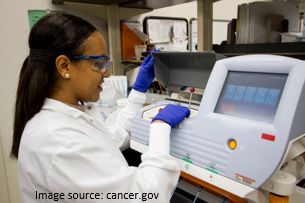Technology Development Resources
Diagnostics Research and Development Resources
Human Specimen Resources
Ethical, Legal and Social Implications of Biobanking in Cancer Research
Assay Harmonization Work
The goal of assay harmonization is to ensure that clinical laboratory test results are comparable, even if test conditions differ. As molecular profiling becomes a widely adopted diagnostic tool in clinical studies and patient care, quality control measures are important to ensure robustness and inter-assay comparability. External reference standards can ensure that assay results are understood in the same context, independent of where or by whom a test is performed. This has direct applications to patient care, where clinical guidelines for diagnosis or disease management may be based on assay results.
The Cancer Diagnosis Program promotes assay harmonization efforts within the cancer research community by providing resources including funding opportunities and recommendations on harmonization requirements and approaches.
Activities and Resources
CIMAC-CIDC Harmonized Assays
The Cancer Immune Monitoring and Analysis Centers (CIMACs), are four multidisciplinary academic centers (Dana-Farber Cancer Institute, Icahn School of Medicine at Mount Sinai, MD Anderson Cancer Center, and Stanford University) that provide analytical support to early phase clinical trials. As part of the CIMAC-CIDC network,  the CIMACs work collaboratively with the Cancer Immunologic Data Commons (CIDC) to enable data standardization and develop uniform analysis pipelines across the network's studies.
the CIMACs work collaboratively with the Cancer Immunologic Data Commons (CIDC) to enable data standardization and develop uniform analysis pipelines across the network's studies.
While some centers also perform certain specialized assays, the CIMACs all provide a set of core assays that have been harmonized across the four centers. Harmonized protocols for these commonly performed assays allow comparison of datasets across CIMAC sites and studies. The synchronization effort included the use of common standard operating procedures and cross-site variability experiments. The CIMACs also make use of reference materials for longitudinal monitoring of core assay performance across network. For more information on the CIMAC-CIDC Network, including recent publications, please visit our page here.
NCI-MATCH
The precision medicine trials NCI-MATCH (Molecular Analysis for Therapy Choice) and NCI-COG Pediatric MATCH rely on a network of laboratories using harmonized next generation DNA sequencing assays to identify potentially eligible patients.
To begin screening for NCI MATCH, four CLIA accredited laboratories worked together to develop and validate a robust, standardized, and reproducible next-generation sequencing assay. The groups at the different labs harmonized experimental conditions prior to assay validation and utilized common standard operating procedures throughout the assay development and validation. This report describes the analytical validation processes for the assay that was developed and harmonized between the four labs for regulatory compliant use in the trial.
SPOT/Dx Working Group
The Sustainable Predictive Oncology Therapeutics and Diagnostics (SPOT/Dx) Working Group was launched in 2013 by Tapestry Networks  along with private and public partners, to promote discussion between healthcare system stakeholders on the future of precision medicine in cancer diagnosis and treatment, and collaborative approaches for developing reliable predictive diagnostics. The working group recognized a gap between biomarker identification and diagnostic development, and further, a need for system-wide quality assurance in NGS assays used to assign targeted therapies.
along with private and public partners, to promote discussion between healthcare system stakeholders on the future of precision medicine in cancer diagnosis and treatment, and collaborative approaches for developing reliable predictive diagnostics. The working group recognized a gap between biomarker identification and diagnostic development, and further, a need for system-wide quality assurance in NGS assays used to assign targeted therapies.
Having identified harmonization as a prerequisite for reliable widespread use of molecular diagnostic tests, a subset of the SPOT/Dx Working Group designed the Diagnostic Quality Assurance Pilot to focus on achieving inter-laboratory standardization across different platforms through the use of reference standards. Participating clinical laboratories were provided with reference samples and in silico files and were evaluated on the analytical performance of their own validated platforms compared to an FDA-approved companion diagnostic. The Cancer Diagnosis Program participated as an observer on the steering committee for the pilot. The outcomes of the project were recently presented in this Tapestry Networks publication. 
EBV DNA in Plasma/Serum/Blood

In 2015, the Cancer Diagnosis Program convened a Workshop on Harmonization of EBV Testing for Nasopharyngeal Cancer, where experts in head and neck oncology and laboratory medicine addressed the limitations of currently available polymerase chain reaction-based EBV DNA quantitation assays and discussed strategies for advancing the development and appropriate clinical use of harmonized EBV DNA assays.
The workshop resulted in two publications accessible below:
- This article presents the key recommendations to direct future efforts in assay harmonization and validation. djx007.10.1016/j.ijrobp.2017.03.018.
- This article discussed the clinical utility of EBV DNA testing and issues that need to be considered for future studies aimed at informing clinical practice guidelines for EBV DNA.
https://www.ncbi.nlm.nih.gov/pubmed/28721913





